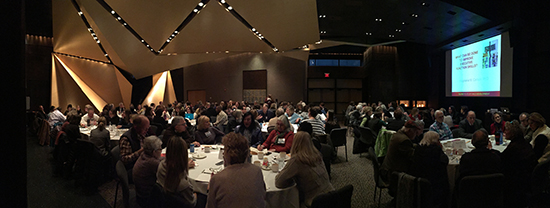 The Institute of Child Development held its second ICD Community Symposium on February 5. The Achievement Gap: Why Executive Function Matters, provided a forum for leading faculty researchers at ICD to share their newest findings about executive function and its relationship to the achievement gap with those working in the area’s hospitals, schools and social service organizations. Executive function skills are those skills children use to control their behavior and to set and achieve goals. Research has shown that the lack of good executive function skills is one of the reasons that the achievement gap persists and that improving EF skills predicts later academic success.
The Institute of Child Development held its second ICD Community Symposium on February 5. The Achievement Gap: Why Executive Function Matters, provided a forum for leading faculty researchers at ICD to share their newest findings about executive function and its relationship to the achievement gap with those working in the area’s hospitals, schools and social service organizations. Executive function skills are those skills children use to control their behavior and to set and achieve goals. Research has shown that the lack of good executive function skills is one of the reasons that the achievement gap persists and that improving EF skills predicts later academic success.
The symposium featured presentations by Lindahl Professor Phil Zelazo, and professors Kathleen Thomas, Stephanie Carlson, and Michele Mazzocco from the Institute of Child Development and Harry Boyte, senior scholar in public work philosophy at the Sabo Center for Democracy and Citizenship at Augsburg College and senior fellow at the Humphrey School of Public Affairs. Throughout the program, ICD faculty joined participants for small group discussions.
Boyte opened the Symposium discussing the intersection between improving executive function (EF) skills and growing the skills of civic agency. Boyte argued that EF helps refocus attention on human agency. He stressed that every environment can be a context for developing the EF skills of children, and also of their educators and parents – and EF skill-building can be understood as about developing the agents and architects of a democratic society. Boyte’s subsequent articles in the Huffington Post, Walker’s “Drafting Error” and the Democratic Promise of Executive Function and Civic Agency and Executive Function: An Emerging Conversation elaborate on this theme.
Institute faculty then highlighted important aspects of their research on executive function. Phil Zelazo examined the relationship between the achievement gap and executive function (EF), citing research that shows the biggest gains in EF skills occur when children are between 3-5 years old. So, helping children practice executive function skills improves children’s chances to learn and achieve not only in early childhood, but also predict long-term, future academic and social success.
Kathleen Thomas examined how an individual’s environmental experience contributes to brain development and EF. The prefrontal cortex is the main brain region that is important for performance on EF tasks. EF skills and the brain both develop rapidly in childhood, and continue to develop during adolescence. During early childhood, the brain is especially open to influences from the environment, and although this plasticity leaves us vulnerable to adverse experiences, it also allows us to benefit from positive environment.
Stephanie Carlson spoke about the types of interventions being developed to help children improve their EF skills and be better prepared for school. Key to developing successful intervention tools is using an accurate measurement of EF skills, which can now be done with Minnesota Executive Function Scale. Most interventions focus on teaching children to stop, pause, reflect and think through options. Old-fashioned practice is the most effective tool to improve EF skills.
Michele Mazzocco spoke about the impact of EF skill building on the development of mathematics proficiency, as proficiency supports a range of academic, leisure, and career skills. Solving word problems or arithmetic calculations requires selective attention, planning, self-monitoring, impulse control, and evaluation of either intermediate or final steps and solutions. This means that strengthening children’s EF skills provides them with tools that support their math learning and problem solving, at all levels of math learning.



